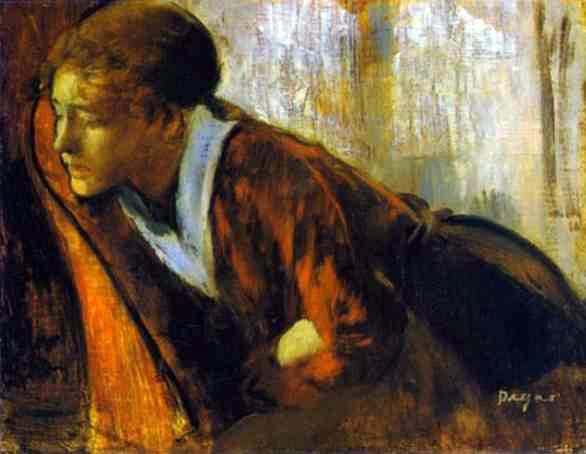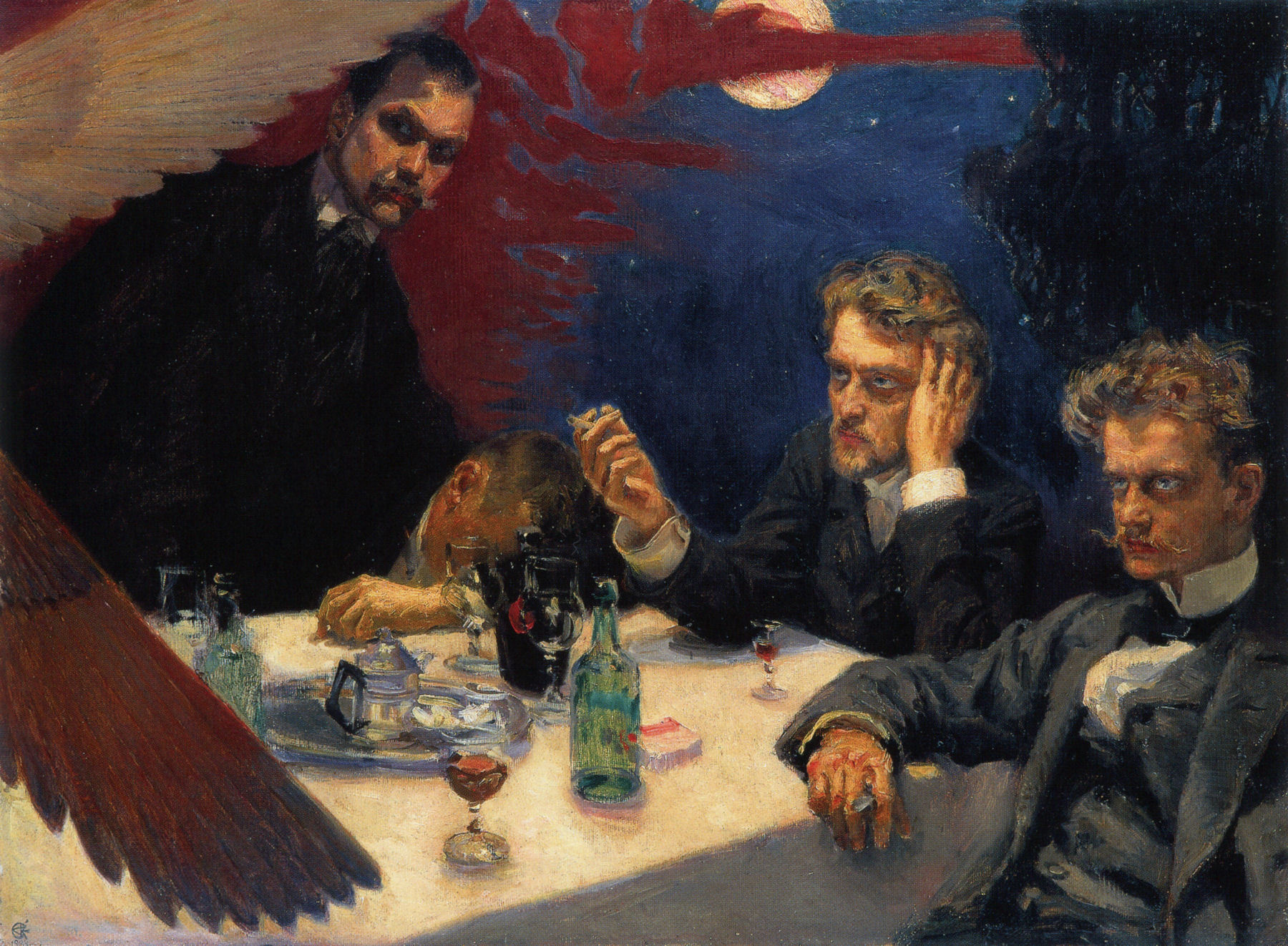Mal du siècle on:
[Wikipedia]
[Google]
[Amazon]

 ''Mal du siècle'' (, "sickness of the century") is a term used to refer to the
''Mal du siècle'' (, "sickness of the century") is a term used to refer to the
Atala and René
* * {{DEFAULTSORT:Mal Du Siecle Emotion European literature French literature Literature of England History of Europe Romanticism fr:Thèmes récurrents du romantisme#Mal du siècle et mélancolie
 ''Mal du siècle'' (, "sickness of the century") is a term used to refer to the
''Mal du siècle'' (, "sickness of the century") is a term used to refer to the ennui
In conventional usage, boredom, ennui, or tedium is an emotional and occasionally psychological state experienced when an individual is left without anything in particular to do, is listlessness and dissatisfaction arising from a lack of occup ...
, disillusionment, and melancholy experienced by primarily young adults
A young adult is generally a person in the years following adolescence. Definitions and opinions on what qualifies as a young adult vary, with works such as Erik Erikson's stages of human development significantly influencing the definition of ...
of Europe
Europe is a large peninsula conventionally considered a continent in its own right because of its great physical size and the weight of its history and traditions. Europe is also considered a Continent#Subcontinents, subcontinent of Eurasia ...
's early 19th century, when speaking in terms of the rising Romantic movement. François-René de Chateaubriand
François-René, vicomte de Chateaubriand (4 September 1768 – 4 July 1848) was a French writer, politician, diplomat and historian who had a notable influence on French literature of the nineteenth century. Descended from an old aristocrati ...
's protagonist René
René (''born again'' or ''reborn'' in French) is a common first name in French-speaking, Spanish-speaking, and German-speaking countries. It derives from the Latin name Renatus.
René is the masculine form of the name (Renée being the feminin ...
characterizes the Romantic ennui that would become a benchmark of the Romantic esthetic in the first half of the century:
René is a young man who was suffering from the moral malady known as "le mal du siècle". This was an "état d'âme"State of the soul that was not uncommon during the first half of the nineteenth century, and that was often copied and idealized in literature. It was largely boredom. Other manifestations were: melancholy of an aristocratic type, precocious apathy, discouragement without cause, distaste for living. The will seemed paralyzed by the contemplation of life's struggle. Faith and a sense of duty were alike absent. Man was "possédé, tourmenté par le démon de son cœur."Possessed, tormented by the demon of his heart Morbid sadness was mistaken for the suffering of a proud and superior mind. There was in it all a certain "bonheur d'être triste"Happiness at being sad which attracted. This pessimistic state was analyzed in ''René'' with great subtlety and penetration. The hero was made a most original and living type, a type that was repeated in the ''While Chateaubriand was the first to "diagnose" this "illness", it isChilde Harold ''Childe Harold's Pilgrimage'' is a long narrative poem in four parts written by Lord Byron. The poem was published between 1812 and 1818. Dedicated to " Ianthe", it describes the travels and reflections of a world-weary young man, who is dis ...'' and '' Manfred'' ofByron George Gordon Byron, 6th Baron Byron (22 January 1788 – 19 April 1824), known simply as Lord Byron, was an English romantic poet and peer. He was one of the leading figures of the Romantic movement, and has been regarded as among the ..., and even, in some of its manifestations, in the ''Hernani Hernani may refer to: *Hernani, Eastern Samar, a municipality in Eastern Samar, Philippines *Hernani, Gipuzkoa, a town in Gipuzkoa, Basque Autonomous Community, Spain * ''Hernani'' (drama), a Romantic drama by Victor Hugo * Hernani CRE, a Spanish r ...'' ofVictor Hugo Victor-Marie Hugo (; 26 February 1802 – 22 May 1885) was a French Romantic writer and politician. During a literary career that spanned more than sixty years, he wrote in a variety of genres and forms. He is considered to be one of the great .... In the opinion of Chateaubriand, ''René'' was his masterpiece. Later judgments regarding it are not unanimous, but many authoritative French critics see in it one of the masterpieces of theirliterature Literature is any collection of Writing, written work, but it is also used more narrowly for writings specifically considered to be an art form, especially prose fiction, drama, and poetry. In recent centuries, the definition has expanded to ....
Alfred de Musset
Alfred Louis Charles de Musset-Pathay (; 11 December 1810 – 2 May 1857) was a French dramatist, poet, and novelist.His names are often reversed "Louis Charles Alfred de Musset": see "(Louis Charles) Alfred de Musset" (bio), Biography.com, 2007 ...
who further popularized the notion of a "mal du siècle" in his ''La Confession d'un enfant du siècle'' (Confession of a Child of the Century). Musset notably attributed the malady to the loss of Napoleon Bonaparte
Napoleon Bonaparte ; it, Napoleone Bonaparte, ; co, Napulione Buonaparte. (born Napoleone Buonaparte; 15 August 1769 – 5 May 1821), later known by his regnal name Napoleon I, was a French military commander and political leader wh ...
, the French nation's modern father figure:
Voilà dans quel chaos il fallut choisir alors; voilà ce qui se présentait à des enfants pleins de force et d'audace, fils de l'empire et petits-fils de la révolution. ..l'esprit du siècle, ange du crépuscule, qui n'est ni la nuit, ni le jour.Musset, Alfred de. ''La Confession d'un enfant du siècle''. Paris: Garnier-Flammarion, 1993, p. 31
Lo and behold in what chaos, then, one must choose; behold the choice that is given to children full of strength and audacity, sons of the Empire and grandsons of the Revolution. ..the spirit of the century, angel of dusk, that which is neither night nor day.
See also
* ''Fin de siècle
() is a French term meaning "end of century,” a phrase which typically encompasses both the meaning of the similar English idiom "turn of the century" and also makes reference to the closing of one era and onset of another. Without context, ...
''
* ''Weltschmerz
(; literally "world-pain") is a literary concept describing the feeling experienced by an individual who believes that reality can never satisfy the expectations of the mind, resulting in "a mood of weariness or sadness about life arising from ...
''
Notes
References
External links
Atala and René
* * {{DEFAULTSORT:Mal Du Siecle Emotion European literature French literature Literature of England History of Europe Romanticism fr:Thèmes récurrents du romantisme#Mal du siècle et mélancolie